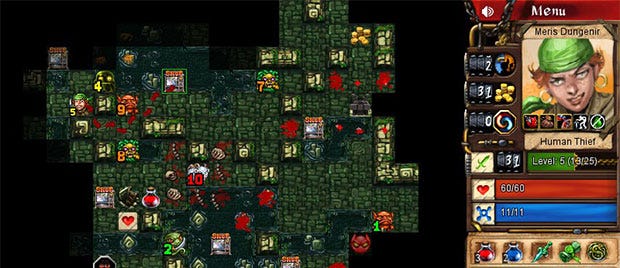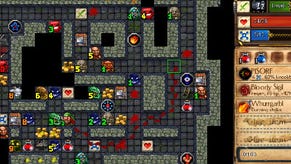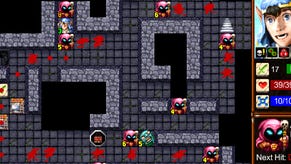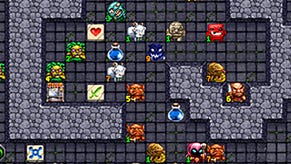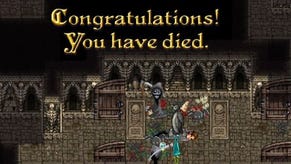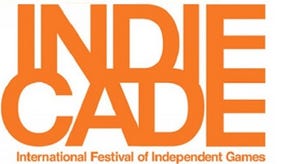Impressions: Desktop Dungeons
Safe or death
First things first: I had every intention of making this a full Wot I Think, but, um, the game's so damned tough/ I'm so damned weak that I haven't been able to progress far enough for that. Impressions it is, then! I may follow up later with thoughts on the later game if I manage to get there in a timely fashion.
I have been posting about Desktop Dungeons for 9% of my entire life. Not constantly, of course, though sometimes it feels like it. Who'd have thought a a clever little one-level roguelike could wind up taking three years to come to fruition? 'Tis a strange thing indeed to be sat here, offering a judgement of sorts on a free downloadable game I enthused about back in 2010. That free downloadable game is now a far fancier-panted game with a pricetag, which was released yesterday. I've been playing it today. All of today.
Desktop Dungeons has changed over the course of those thousand-odd days, but not quite as much as I'd feared. Beneath a new overworld and quest system lurks the same steely wolf in cheery sheep's clothing. Look at the cute if slightly mutated little men! This will be a casual, friendly game. No, it most certainly will not. This will be a game that punishes laziness and recklessness, that will make you suffer for even a single impulsive click, that will make your plan and curse and try, try, try again even after relentless defeats. It's a brilliant design, the core of Desktop Dungeons, and it has entirely survived its expansion into something bigger.
Here's how it works, if you never tried the freeware version (retroactively dubbed the alpha). It's still available though, and as well as serving as a jolly decent demo for the new edition, it'll also do a better job of explaining itself than I will. You take your squat, silent character of choice - those choices entailing the Gauntlety likes of Warrior, Thief, Wizard and Priest, but more become available if certain challenges are met - into a dungeon. The dungeon is a single screen divided into tiles, all of which are occluded until you move adjacent to them. In those tiles lurk monsters and lurk power-ups. Killing monsters grants experience points, experience points level you up, and power-ups add bonus abilities or improve your base stats.
Desktop Dungeons consciously reads from a very familiar lexicon, employing terminology most people reading these words likely grew up with, but it dilutes those roleplaying essentials down to their rawest essence and then puts them into a system where combat is as simple as the strongest guy wins, the weakest guy dies. This means that, broadly speaking, you're wandering around the dungeon killing monsters in order - level 1s first, then the 2s, all the way up to the fearsome Level 10 boss, beating whom completes the quest. Hooray!
Only if you do that, you probably won't level up fast enough, because a level 3 hero killing a level 3 monster doesn't mean many experience points. But a level 3 hero killing a level 4 monster, or even a level 5 one - now you're talking. Now you're building muscle. So the trick is to find a way to beat that level 4 or 5 monster, which out of the box hits harder than you and has far more hitpoints than you do. If it kills you, the level/quest is over and you have to restart, losing any loot you might have gained - as roguelikelike as they come.
And so to the powerups. Sword icons increase your biffability, heart icons increase your biff-absorbability and a sort of blue starburst increases your pool of mana. You need to round up as many of these as you can in the hope of exceeding the capabilities of the level your character is, but a brilliant complication there is that immediately exploring the entire dungeon is slow-motion suicide. This is because every time you walk into a new tile, you regenerate a small amount of health and mana. So if you've uncovered everything, you're leaving yourself with no way to go lick your wounds after a brutal fight (potions aside, but these are in relatively short supply). Thus, Desktop Dungeons is a game of tile-by-tile creeping, and maximum efficiency. If you're moving somewhere, you'd better be damn sure it's for a good reason - you're going to kill something, you've seen a power-up you particularly need, or you've plum run out of other possible, or at least, survivable things to do.
It's a stressful game, in the best possible way - stress that drives you to do better, try harder, understand more. The consequence of ill-judged moves early on may not become apparent until the final stages of a quest, when you're up against fearsome level 9s or even the boss, and you're just a handful of experience points or a single potion short of victory. In a canny but dastardly design decision, Desktop Dungeons ensures you'll be well aware that you're going to die several moves before it happens. Hover the mouse over an enemy and the game will show you the outcome of the next attack - how much damage you'll do, how much health the monster will take in retaliation, any extra effects such as mana drain, and whether by the end of that exchange of blows you are SAFE or DEATH. Yeah, the grammar doesn't quite work, does it? Safe or death! Safe or death! But you get the point.
There are plenty of ways around DEATH, primarily the gradual collection of some of a random assortment of powers. One gives you a 30% biff boost for the next attack, another lobs a fireball that the enemy can't retaliate against (so it's a free hit), another gives your foe a good, hard shove into the nearest wall, another ensures you strike first rather than second (this is vital against certain, super-speedy foes), another can teleport foes of the same level as you right over to you, for easy, on-the-spot murder without having to uncover precious tiles.
It's gently complex and impeccably well-balanced. I have failed quests so very many times, and each time I have turned the air bluer than Captain Oates' winky, but those oaths were never uttered at the game - only at my hapless self. There is a degree of unfairness in some dungeons' randomly-chosen loadouts, a certain cruelty if one of the most useful spells doesn't put in an appearance, but for the most part it's always clear that failure was my fault. Not enough planning ahead, reckless surges or use of precious potions, or most likely simply not thinking hard enough and instead rote-killing beasts in level 1-10 order, which tends to stop being effective around level 7. Not safe! Death!
It is, to quote the bard, tight: as well-balanced as God's own see-saw, and as unforgiving as the fast food jobsworth faced with someone ordering a breakfast muffin at 12.01. It is, or at least can be, brutally hard too. The quandry I'm in, as I mentioned earlier, is that I've hit some brick walls in terms of progression, because so far I am not up to the challenge, at least past the early missions. I'm confident I will be, that I'm gradually learning new tricks and what mistakes to avoid, and while I have experienced some frustration today I'm quite glad that I've got a game for the long haul rather than to burn my way right through fast.
The long haul is something which wasn't there in the alpha, but is in this new, paid version. There's an overworld, which consists of buildings to upgrade in order to unlock new types of hero and starting gear, access points to dungeons of varying difficulty and bonus modes/prefab challenges designed to tax you further and give out big rewards. I'd worried, from brief experience with the beta, that this aspect of the game would overwhelm the core puzzle-dungeoneering and turn DD into so much busywork and grinding rather than an ingenious and fiendish test of wits, but while it does lack the neatness and the clarity of vision of the dungeons, it does its job and makes DD feel like a game to spend hours in a sitting with, rather than dip in and out of in ten minute chunks.
The main thing it does is give a reason to beat a dungeon for more than simply bragging rights. You'll come back with a smattering of cash to spend on upgrading your town and making you more able to tackle harder dungeons - classic RPG stuff, though it's important to note that the player understanding the game better over time is far more important than the unlocks, most of which are about increasing choice of character types rather than making things easier. This isn't Diablo: a bigger sword won't help. Similarly, the characters you control are utterly disposable - randomly-named each time, disappearing from sight forever once their dungeon run is completed (be it in victory or in death), because they too are simply temporary tools that the good workman makes the best use they can of. DD is about you, not your character.
I'll have to report back later on the meta-game aspect later though, as I'm still moping around the early dungeons with only the basic character classes unlocked for the time being, but right now is does feel like the game has the right ingredients to helplessly obsess me. Oh yes, that old Skinner box is very much in evidence, but DD requires that you open it up with the utmost precision rather than just greedily grab at it.
I must mention how lovely the music in nu-DD is. It goes all over the place too, from playful ditties to John Williams-esque drama. I don't usually notice that sort of thing too much (sorry, composers) but it really stands out here. Sadly, its lavishness is at odds with the low graphical targets DD has set itself. The blobby, deformed art style suits its well, and I have no issue with the lack of animation - a boardgame feel suits the mechanics - but sadly it's locked to 720p and looks horribly fuzzy and pixelly on higher-res monitors. Windowed mode, meanwhile, is tiny. Seems a terrible shame, it dates the game and it wastes splendid artwork. I hope later updates fix that, and save DD from looking like a 2008 browser game.
Nonetheless, I'm happy with the game so far even if I'm not happy with my own failure to master it quite yet, and I'm happy that DD has retained its pull and its ice-cold nature even after three years and a major redesign. Now if you'll excuse me, I really should go and get myself killed again.
Desktop Dungeons is out now.
